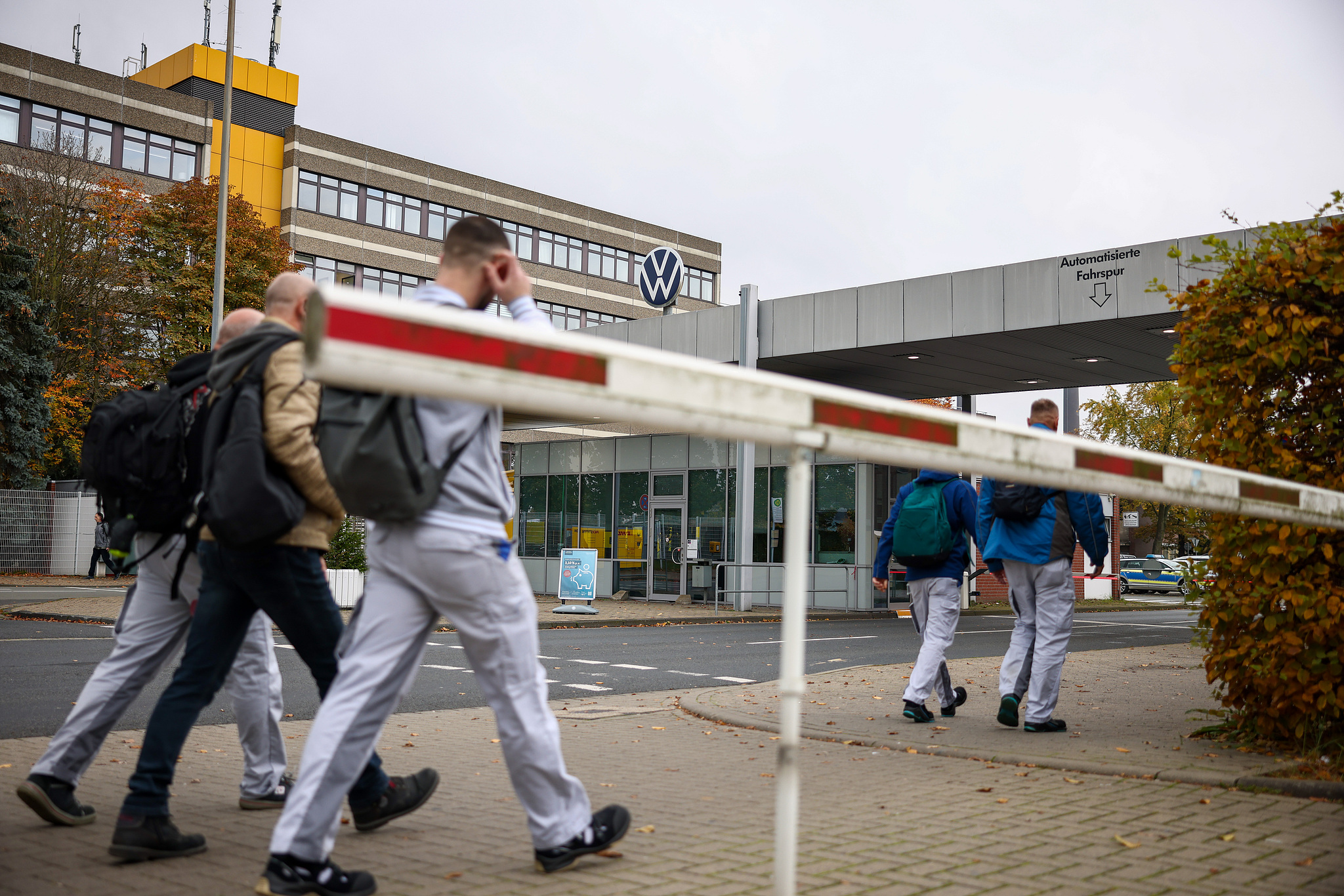
Due to the declining demand in the European market, the likelihood of Volkswagen Group's plan to close its factories in Germany has been steadily increasing.
According to reports from foreign media, a statement from Volkswagen Group's employee representatives revealed that the management intends to shut down at least three factories, cut thousands of jobs, and reduce the salaries of remaining employees by 10%. Additionally, Volkswagen plans to downsize all remaining factories, which could lead to many projects or even entire departments being outsourced to third-party service providers.

On October 28, 2024, in Wolfsburg, Germany, workers enter the Volkswagen factory.
Daniela Cavallo, Chairwoman of the Volkswagen Works Council, stated during her speech at Volkswagen's main factory in Wolfsburg: “All German Volkswagen factories are affected. None of them are safe!”
In the three months prior, Volkswagen had issued two profit warnings. The weak demand in the European market, combined with the challenging transition to electric vehicles, has weakened its profitability.
Reports indicate that in addition to the 10% salary cut, Volkswagen will freeze the wages of these factory employees for 2025 and 2026. The board also hopes to eliminate the €167 monthly collective bargaining premium and other bonuses for employees.
This series of measures is part of Volkswagen Group's plan to save €4 billion. If this plan continues to move forward, it will mark the first time in Volkswagen's 87-year history that it closes domestic factories. Currently, Volkswagen has 10 factories and 300,000 employees in Germany.
Daniela Cavallo expressed: “For over a year, the board has failed to provide us with the core brand objectives for Volkswagen... The board still shows no signs of developing future plans.” She believes it is unreasonable to blindly cut jobs and close factories without clear objectives.
She also called for politicians and industry leaders to develop a “comprehensive plan” for the transition to electric vehicles, enhancing Germany's viability as an industrial hub.
A government spokesperson quoted by Reuters stated: “It is well-known that Volkswagen is in a predicament... Daniela Cavallo's stance is clear: past potential mismanagement decisions must not come at the expense of employees. The focus now should be on maintaining and ensuring jobs.”
On October 30, union leaders, including Daniela Cavallo, will meet with representatives from Volkswagen for the second round of collective negotiations.
Regarding the recent series of changes, Volkswagen Group had previously indicated to the media that these moves were part of a global cost-cutting strategy.
At the end of May this year, Volkswagen Group announced a plan to achieve a 20% efficiency increase over the next three years based on 2023 figures, but at that time emphasized that the 20% increase did not mean layoffs but referred to indirect labor costs such as administration, travel, and training. However, as time has passed, the group seems to have opted for the most straightforward cost-cutting method.
Financial reports show that Volkswagen's net profit for the first half of the year decreased by 14% year-on-year. In the third quarter, global sales dropped 7.1% to 2,176,300 vehicles.
Volkswagen anticipates a profit margin of approximately 5.6% in 2024, lower than the previously expected range of 6.5% to 7%. They project a 0.7% decline in annual sales revenue to €320 billion, compared to earlier expectations of 5% annual growth; global vehicle deliveries in 2024 are expected to be around 9 million, below the previous target of a 3% increase over 2023 (9.24 million units).
Among these, the group's profit powerhouse Porsche saw its revenue decline by 5.2% year-on-year to €28.56 billion in the first three quarters, with operating profit dropping 27% and cash flow from automotive operations down 63%, while operating profit fell by 41%.
Porsche CFO Lutz Meschke revealed that the company plans to cut billions of euros in costs by 2030.
Regarding planned cost-cutting measures, Thomas Schäfer, CEO of Volkswagen Passenger Cars, provided a straightforward explanation: “We must find the root of the problem: our productivity in Germany is insufficient, and our factory costs are currently 25% to 50% higher than the original target. This means that the costs of some of our German factories are twice that of our competitors.”
It is not only Volkswagen Group facing challenges; other giants like BMW and Mercedes-Benz have also adjusted their performance expectations in the new competitive environment as they prepare for a "cold winter."